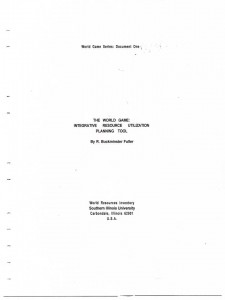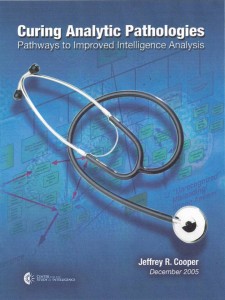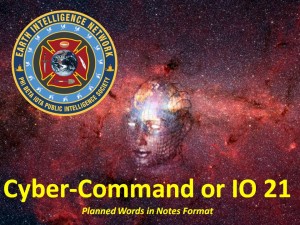
Reference: Emergent Democracy
11 Society, About the Idea, Advanced Cyber/IO, Civil Society, Collective Intelligence, Cultural Intelligence, Ethics, Methods & Process
EXTRACT from Google Group Next Net:
That made me think of the Emergent Democracy paper that Joi Ito authored collaboratively (2001-2003) with several other folks (including Ross Mayfield and I) a few years ago. Digging into my files I found the attached marked up version… it aligns pretty well with some of the discussions here.
There's been a lot of interesting thought about the Internet and the web as platform for enhanced social activity. That idea of “finding our tribes and ourselves” was a core aspect of FringeWare, the company/community that Paco Nathan and I started in 1991. We realized that like-minded fringe thinkers and doers were scattered everywhere, and the Internet gave us a platform where they could find each other and form community. All it took was an email list and a compelling concept (“fringeware”) to catalyze that community.
“Declaration of Interdependence” sounded familiar… I did some searching…
https://projects.eff.org/~barlow/Declaration-Final.html – Barlow wrote this, and I think he referred to it (earlier or later, not sure which) as a declaration of interdependence).
http://notanmba.com/blog/2008/03/a-declaration-of-interdependence – This notes that the Whole Foods mission statement is called “declaration of interdependence” – http://www.wholefoodsmarket.com/company/declaration.php. This also refers to the Barlow document and our 2008 EFF-Austin party.
Interestingly, Will Durant made a “declaration of interdependence” in 1945. http://www.willdurant.com/interdependence.htm
Journal: Politics & Intelligence–Partners Only When Integrity is Central to Both
Review: Evolutionary Activism by Tom Atlee
Review: Philosophy and the Social Problem–The Annotated Edition
Seth Godin: Wasting the Digital Dividend
About the Idea, Corruption, Cultural Intelligence, IO Impotency
Wasting the digital dividend
The internet means that many time-consuming forms of white-collar drudgery have disappeared, or at least been offloaded to cheaper people who aren't you, permitting you to spend more time on things that are actually productive and highly leveraged.
No more standing in line at the copier, trudging to the Fedex box, waiting two weeks for a letter to be returned, leaving voice mails, searching for the right person to contact, waiting months to learn a skill or a fact, discovering that a project is hopelessly broken, and on and on.
It's a little like the bump we got after the Cold War ended. The peace dividend was there, just waiting for us to repurpose our military, our military budget and our military research. We didn't. We squandered the window, wasted the money and didn't rush to fill it with the sort of top-down industrial projects (like high speed rail and efficient new forms of energy) that could have changed everything.
So, what are you going to do with the digital dividend? Cruise Facebook?
Phi Beta Iota: The blatant dishonesty of the US Government is breath-taking in that it fails to inspire a public backlash. Instead of spending $12 billion a year on Internet freedom, it spends it on corporate vapor-ware ostensibly to achieve cyber-security. NEWS FLASH: The current grid is impossible to defend and not worth defending; what we can steal is not worth the cost or time. For the public to not realize that one third of the federal budget, over one trillion a year is borrowed, and to allow the “debate” to be about less than $100 million, suggests that the US public has the government it deserves: the stupid “led” by the unethical.
Handbook: Curing Analytic Pathologies
AnalysisSearch: “the truth at any cost reduces all other
About the IdeaThis is Robert Steele's core phrase, apart from the two Latin mottos (at end).
“The truth at any cost lowers all other costs.”
Citation (2 options):
Robert Steele, “About” at Phi Beta Iota the Public Intelligence Blog, 4 July 2010.
Robert Steele, “Cyber-Command or IO 21,” US Army Information Operations Conference, 6 April 2011.
It was inspired by Herman Daly and other champions of “true cost” and ecological economics. Also influencial were these two quotes as found on the About page of Phi Beta Iota the Public Intelligence Blog.
Fedor Dostoevsky: A man who lies to himself, and believes his own lies, becomes unable to recognize truth, either in himself or in anyone else.
Bob Seelert, Chairman of Saatchi & Saatchi Worldwide (New York): When things are not going well, until you get the truth out on the table, no matter how ugly, you are not in a position to deal with it.
Latin mottos
E Veritate Potens. From Truth We (the People) Are Made Powerful. Created for OSS.Net, Inc.
Connexum Sumus Unum. Connected, We Are One. Created for Earth Intelligence Network, 501c3.
Still need a Latin scholar to certify the new one (Connexum…)
2011 Cyber-Command or IO 21 + IO Roots
Advanced Cyber/IO, Briefings & LecturesBriefing (28 Slides) Version 3.2 (Notes As Delivered)
Open Source Intelligence (OSINT) Starting Point
2009 DoD OSINT Leadership and Staff Briefings
Below the Line: Unclassified Impressions & Questions, Three Books on Truth, Past OSINT and IO References with Emphasis on Multinational Sharing and Sense-Making
Handbook: How to Negotiate a Ceasefire
Law Enforcement, Military, Stabilization, Threats/Topical, UN/NGO Kristan Wheaton posted the below to his blog yesterday:
Kristan Wheaton posted the below to his blog yesterday:
How To Negotiate A Ceasefire (HDCentre.org)
The Centre For Humanitarian Dialogue, located in Geneva, Switzerland, has done a really good job of pulling together a concise monograph called “Negotiating Ceasefires”.
Only 44 pages from start to finish (including endnotes and a comprehensive list of suggested additional readings), this guidebook is filled with practical advice, concise case studies and quotes from practitioners about the risks and rewards inherent in negotiating a ceasefire.



